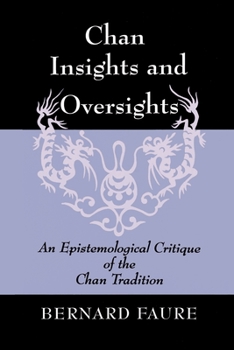Chan Insights and Oversights: An Epistemological Critique of the Chan Tradition
Select Format
Select Condition 
Book Overview
For many people attracted to Eastern religions (particularly Zen Buddhism), Asia seems the source of all wisdom. As Bernard Faure examines the study of Chan/Zen from the standpoint of postmodern human... This description may be from another edition of this product.
Format:Hardcover
Language:English
ISBN:0691069484
ISBN13:9780691069487
Release Date:April 1993
Publisher:Princeton University Press
Length:340 Pages
Weight:1.55 lbs.
Customer Reviews
3 ratings
A very tough read
Published by Thriftbooks.com User , 17 years ago
I gave this a high rating for its value as a reference book. But this and "Selfless Persons" are two very tough reads. This is a highly academic work. I usually like highly academic works, but I think you have to be functioning at an awfully high level in the world of Chan Buddhism to be comfortable with this text.
Chan Oversight, rather than insights
Published by Thriftbooks.com User , 19 years ago
It is hard to discount the praise of able scholars such as Martin Collcut,but this book deserves five stars - for sheer audacity! Like all spiritual traditions, the Ch'an (Zen) tradition has seen peaks of inspiration - and periods of decline, bringing formalism and rigidity.However, it begs a number of questions to suggest - as Bernard Faure does, that the lineages of the Ch'an tradition were fabricated to serve ideological purposes. As with 'The Rhetoric of Immediacy' - Bernard Faure creates straw men, so that he can appear astute in spotting them. For example, he troubles himself to point out that we shouldn't identify 'Rinzai' and 'Soto' Zen - with the alleged split that occured between the 'Northern' and 'Southern' schools of Ch'an, but who said that we should? In traditional records such as the Chuan Teng Lu (Dentoroku), we find masters such as Ma-tsu and Shih-t'ou sending their followers back and forth between each other's temples. These were, if you like, the prototypical lineages which eventually became the 'Rinzai' and 'Soto' schools, and this open spirit prevailed in the lifetime of Lin-chi (Rinzai) and the two masters -Tung Shan and Ts'ao-shan (Tozan and Sozan) - with whom we now identify these schools. Hence, it is anachronistic and meaningless to suggest that there was any estrangement between them. At best, the seeds of such estrangement would have to be located in the Sung - with the temporary spat between Ta-hui and Hung Chih, but even that has been blown out of proportion, for Hung-chih actually entrusted Ta-hui with his affairs. Thus, Bernard Faure might have spared himself (and us) the anachronistic speculations, when the traditional sources are clear enough. As for the 'post-modernist' -cum-'deconstructionist' agenda, its bearing upon the Ch'an/Zen tradition is by no means certain. While currently fashionable (everything has now been taken to bits!), one wonders whether masters the ilk of Lin-chi or Dogen need to be aided in this way. If Heidegger is anything to go by, having deconstructed Western philosophy, with nothing to say for the holocaust and the fate of 6 million jews, perhaps we ought to spot the difference between head games - and the spiritual quest - and not confuse the two. There is now a huge tome on sale, the size of a New York phone book, explicating the relationship between post-modern philosophy - and Zen.Thank you very much! So much for the Ch'an/Zen axiom 'pu shuo pu' . . .'not to speak too plainly'! Sorry, deconstructionists, but do us a favour; try some 'sitting' - and shut up!
Post-structuralist Look at Zen
Published by Thriftbooks.com User , 22 years ago
Faure's book is a very ambitious attempt to look at the history of Zen and its relationship with the West, and attempt to see how this has been from the start shaped through ideological battles. He traces the history of this East-West interaction from the first landing of the Jesuits Matteo Ricci and Frances Xavier in China and Japan, respectively, up to Kerouac and the Beat generation in the 1960s. At the same time, Faure employs the concepts, methodologies and epistemological insights of post-structuralist thinkers from Foucault, Derrida, Michel de Certeau, Deleuze and others.The first part of the book is more straightforwardly history and historiography, where Faure develops his main claim that the split between the Northern and Southern Chan schools in China should *not* be equated with the separate approaches of Soto and Rinzai (gradual vs. sudden enlightenment) Chan/Zen. He sees this as a later invention. He also questions the lineages of the Zen/Chan patriarchs as serving ideological purposes, rather than being factually historical.The second part of the book is where Faure develops his post-structuralist thought in examining questions of space and place, time, language, writing, and individuality (a chapter on each of these). This will be quite interesting for those unfamiliar with post-structuralist thought, but the cognoscenti may be disappointed by Faure's conclusions.In general, a good work especially for those who have up to now reacted allergically to "postmodernism" or "deconstruction", since while Faure employs the thinking of these "theorists", he does so in very easy to understand language. Unfortunately, for those who *do* know these thinkers and their works, Faure's efforts may seem only half-successful. For example, while he criticizes other scholars for failing to see the ways in which they were themselves implicated in their theories and writings (he does this to E. Said, DT Suzuki, and many others), he fails to historicize himself, or examining his own ideological "place", his own use of rhetorical techniques, etc.Still, a very good work, and virtually a must read for those studying Zen history and historiography.






